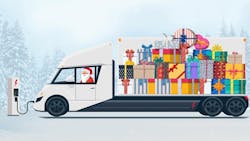I know I have talked about this subject before, but it bears repeating: the future is electric. It may take time to get there, depending on the market segment, but ultimately the future of freight transportation is electric. Until we get to that future, we will all live in what NACFE coined “the messy middle.” I have noticed that term popping up more and more in conversations about the future of trucking, but I am quite certain we were the first to use it. It doesn’t matter; it is real.
Everyone involved in trucking — from fleets, dealers and manufacturers to government officials and NGOs — needs to become educated about both the messy middle and the electric future. If you are a fleet, now is the time to evaluate your operation to see if electric trucks make sense for you. If they do, set up a meeting with your truck OEM (if they are offering an electric truck) or with one of the start-ups and get started with the spec’ing process. There are several reports in the Emerging Technologies section of the NACFE website that can give you some guidance as to what factors to look at as you begin your evaluation.
If in your evaluation you find that electric trucks are not right for you at this point — and that is going to be most folks — don’t just sit back and say to yourself, “I am just going to keep using diesel for the next 20 years.” Go out and explore some of the other alternatives out there. This is all part of the messy middle. While doing this, don’t forget to keep your eyes on battery electric or hydrogen fuel cell electric truck developments because those are the trucks of the future.
If you choose one of the other alternative fuels during the messy middle phase, don't fall in love with it to the exclusion of continuing to keep updated on electric vehicles. What you might end up with is using the other alternative fuel as your new incumbent and delay moving to electric down the road when it is better suited for your application.
We are on the cusp of the messy middle and now is the time to explore options for improving not only the efficiency of your fleet but also the cleanness of your fuel. Between now and 2040, we see various options available to fleets depending on their particular operating characteristics. But I can’t say this any more strongly: in the end, commercial electric vehicles operating from clean energy will be the new standard.
It's time to jump into the middle. I promise you will find a short-term solution that will help you transition into an electric future.
Michael Roeth has worked in the commercial vehicle industry for nearly 30 years, most recently as executive director of the North American Council for Freight Efficiency. He currently serves on the second National Academy of Sciences Committee on Technologies and Approaches for Reducing the Fuel Consumption of Medium and Heavy-Duty Vehicles and has held various positions in engineering, quality, sales and plant management with Navistar and Behr/Cummins.
About the Author

Michael Roeth
Executive Director
Michael Roeth is the executive director of the North American Council for Freight Efficiency. He serves on the second National Academy of Sciences Committee on Technologies and Approaches for Reducing the Fuel Consumption of Medium and Heavy-Duty Vehicles and has held various positions with Navistar and Behr/Cummins.
